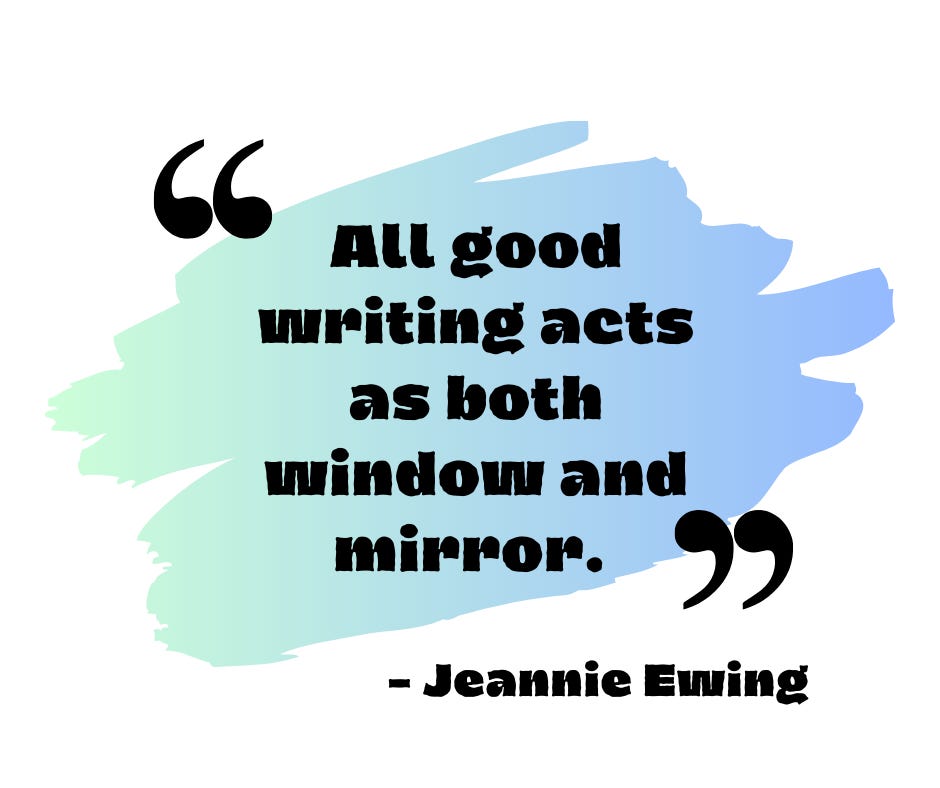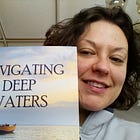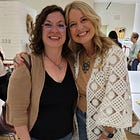Good writing acts as both window and mirror
And is a tool for personal transformation and maturation
I want people to see what might happen if we all chose to be kinder to each other and to ourselves. And I believe that writing can serve that purpose.
For an audio version of this essay, please click here:
During my daily nature walk with our dog, Daisy, I had an insight: that good writing acts as both a window and a mirror for a reader. At the time, I was picturing myself as an elementary-aged schoolgirl, around age ten, standing outside the fence while my classmates played softball during phys ed class. Though I didn’t want to participate, my vantage point offered a unique perspective, because I was able to capture the entirety of the game. Because I wasn’t a pitcher or catcher or base-person or outfielder or batter, I could observe what everyone was doing and, in turn, utilize that information to deduce what might happen next, or whether something was going terribly awry.
That’s the window.
I also imagined myself glancing in the bathroom mirror, washing my face and pinpointing blemishes or new wrinkles, even tiny hairs—which is why I tend to dread or avoid prolonged sessions at the mirror. The inevitable scrutinizing plummets my sense of self and, usually, self-confidence in general.
That’s the mirror.
Not all windows and mirrors reveal disaster or leave us feeling empty-handed or picked apart. (We do that to ourselves enough.) These were the two examples that popped into my mind as Daisy and I ended our fifteen-minute trek around the neighborhood, and I realized they meant something beyond their dismal revelations.
When a piece of writing strikes us, it’s usually because it expands our way of seeing either ourselves or the world, sometimes both. Excellent writing necessarily alters us. If we feel challenged to reconsider our stance on a controversial topic or issue; if we decide that we found the strength to keep going, after all; if we are inspired to be kinder to others or reach out to strangers—all because of something we read—then the writing itself is a conduit for deeper meaning and purpose in our lives.
When a reader comments on an essay or article and relates it to an episode or experience from their own life, that’s a window moment.
When someone discovers an epiphany or insight about themselves, it’s a mirror moment.
Here are two examples, one a window moment and the other a mirror moment. Both of these are real-life excerpts from public comments on recent essays I’ve written. I’ll start with the window:
I was at hospital earlier today and was sitting, waiting for the MRI to be ready, and a little girl with Down syndrome sat with her mother. The mother looked genuinely frazzled, as the little girl was fidgety, etc., just like all other children. I started speaking to the girl, and her mother froze but soon relaxed…All of this because of what you wrote. Bless you for helping me help the little girl.
This episode from the commenter’s life became the means by which he opted to put into practice something he learned from the essay he’d read that day.
Here’s the mirror moment from another reader:
This essay brought back memories of my own childhood. It stuck with me long before I was ever called “ugly.” I had decided inside myself that I was ugly. As an adult, I have been called “incredibly beautiful” by some, “pretty” by others. Over the years, I have come to see my worth and value beyond my appearance. Thank you for sharing about your family. You have inspired me with profound insights.
The reader here was able to see herself differently, in a way that brought about healing and hope, through the message she gleaned from the article. That’s an epiphany. That’s revelation. And that’s what changes us on the inside.
A few years ago, Ben and I took our brood of five to Iowa for a holiday meetup with Ben’s family: his brother James, James’ wife Holly and their two kids who live in the Des Moines area; and his parents who drove from the Denver area. It was Independence Day, and everyone, except James and me, were supervising seven kids at the playground near where we’d set up to watch fireworks that evening.
James said to me, “There will come a time in the near future when no one will read books. They’ll be obsolete. Everything will be digitized, stored on computers or tablets or handheld devices. Physical books won’t exist. Besides, hardly anyone reads anymore, anyway.”
His perspective startled me. After all, I am a writer. And I’m among those (few?) who still read physical copies of books. After the idea simmered in my mind a while, I felt saddened by the possibility that reading is dwindling in general. Reading good works—be it a poem, an essay, an unbiased news article, a commentary, an op-ed, a short story, a reflection or devotion, an entire book or series—makes us better humans.
There’s science to that: one study revealed that stories, especially fictionalized ones, increase compassion and empathy in schoolchildren.1 Could it be that when we enter the mind of a protagonist and join them on their journey through hardship and hope, we learn what it might be like for others in similar situations? Stories emerge from common themes that appeal to every human: solving mysteries and crimes, love and friendship, understanding oneself, rooting for the underdog, etc.
Every one of us solidifies or alters what we understand or believe when we read stories. We might be swayed by them, or we might resolve to form a counterargument. That’s an aspect of critical thinking.
Without stories, civilization would lose its connection to greater meaning. We would lose a sense of belonging and community. We would lose our sense of self.
Stories are the adhesive that bind us to each other. They allow us to enter worlds and minds we’d never otherwise have access to. Words have potency. And what propels me as a writer is to strive to create and share messages that serve as both a glimpse into another person’s heart and a reflection into the heart of the reader.
I want people to see what might happen if we all chose to be kinder to each other and to ourselves. And I believe that writing can serve that purpose.
If you’d like to support my work but can’t commit to a monthly or annual subscription, you can make a one-time donation as a tip here.
The Book Club for Busy Readers
I’m pleased to announce that I’ll be hosting a monthly virtual book club for all of my Substack subscribers, starting in January. Generally, these will be held on the second Sunday of every month (unless otherwise noted) from 2-3:30 PM Eastern via Zoom. In two cases, I have authors who will make a guest appearance to discuss their book with us. If you are interested in joining, I will need you to send an email (jeannie [dot] ewing 07 [at] gmail [dot] com—without spaces), so that I can extend the Zoom invitation month to month.
Click here for more information:
If you enjoyed reading this today, please consider checking out (and sharing!) some of these essays on related topics:
Find more at: https://www.scientificamerican.com/article/novel-finding-reading-literary-fiction-improves-empathy/









Jeannie, your essay beautifully captures the dual nature of writing as both a window and a mirror. It's a powerful reminder that words have the ability to not only transport us to different worlds and perspectives but also to illuminate our own hearts and minds. Your exploration of the impact of stories on empathy and connection deeply resonated with me. In a world that often feels fragmented and divided, the ability of stories to bridge those gaps and foster understanding is more important than ever.
Hi Jeannie,
I LOVE this article. Such good points throughout, and the idea that writing acts as both window and mirror is spot on. I hadn't thought of it quite like that before.
I am also one who prefers to read physical books. I spend so much of my day sitting at my keyboard in front of a screen writing away, scrolling on my phone, and yes, watching a bit too much Netflix, so stepping away with a physical book is a much needed escape from all that. I'm not sure physical books will disappear one day. I sure hope not.
No matter what happens, stories will always connect us and help us be more empathetic. That is the gift of words, no matter how we read (or say) them.